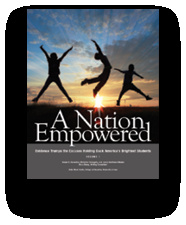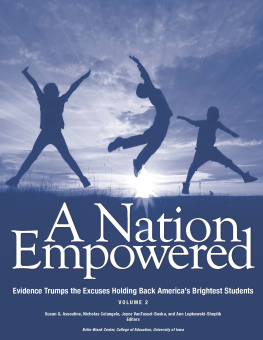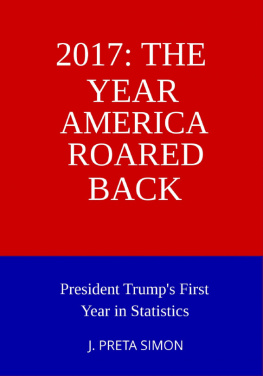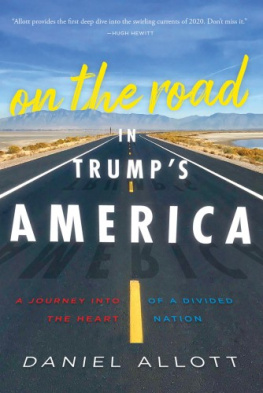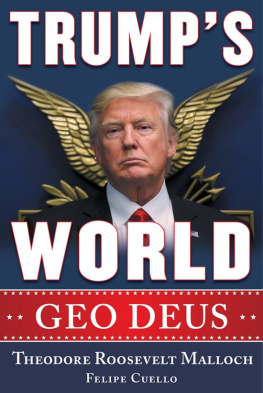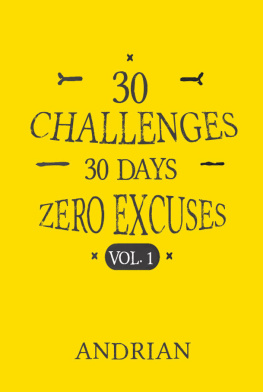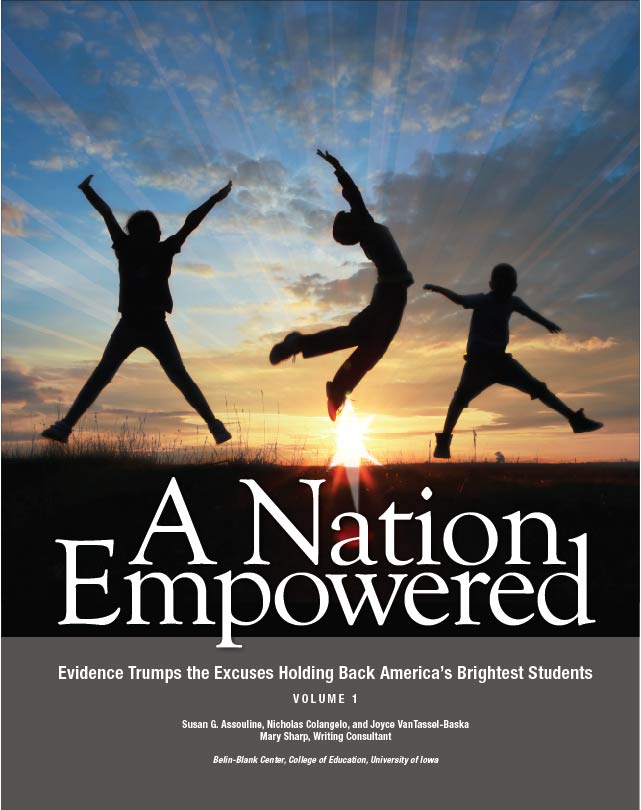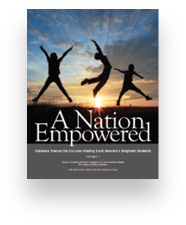Susan G. Assouline, Nicholas Colangelo, and Joyce VanTassel-Baska
Mary Sharp, Writing Consultant
The Connie Belin & Jacqueline N. Blank International Center
Julian C. Stanley, Johns Hopkins University,
founder of the Talent Search Model and the Study of Mathematically Precocious Youth
James J. Gallagher, University of North Carolina - Chapel Hill,
pioneer in educational policy related to special and gifted education
2015 The Connie Belin & Jacqueline N. Blank International Center for Gifted Education and Talent Development
Endorsed by the National Association for Gifted Children, 1331 H Street, NW, Suite 1001, Washington, DC 20005
The Connie Belin & Jacqueline N. Blank International Center for Gifted Education and Talent Development
The Title is the Message
Empowerment represents potency. Robust empirical evidence is the most effective means of empowering educators and parents of gifted students. Historically, educational decisions have been based on subjective beliefs, individual bias, and personal philosophical preference. Empowerment conveys the fortitude to act with a purpose that is grounded in evidence.
I Thank you for reading Volume of the two - volume report, A Nation Empowered: Evidence Trumps the Excuses Holding Back Americas Brightest Student s.
The purpose of this volume is to give voice to accelerated students, their families, and teachers. Acceleration is an educational intervention that can be implemented individually, in small groups, and in large groups. No matter what the format, it is the individual child who is the focus.
We want to re-emphasize our respect for educators who are trying to make the best decisions for their students. In the same way that A Nation Deceived was designed to guide the conversation about acceleration, A Nation Empowered is designed to empower educators with evidence to use in implementing the various types of acceleration highlighted in Volume or Volume 2.
The intervention of acceleration is critical to the success of Americas students. If we recognize individual differences among students, we can serve each student by optimizing learning opportunities.
We hope the evidence in Volumes and 2 of A Nation Empowered will help Americas educators to allow their advanced students to soar .
Acknowledgements
A project such as this requires tremendous team work and collaboration. Our colleagues have been especially gracious in supporting these efforts, and we wish to acknowledge their many contributions.
We acknowledge the continued confidence and financial backing from members of the Belin-Blank Center Advisory Board: Board President Thomas Belin; Board Member Laurie Belin; Board Members Jeff Perry and Beverly Blank Perry; and Chuck Peters, CEO of Sourcemedia. Robyn Hepker of Benson & Hepker Design; Mary Sharp, Writing Consultant; Fusionfarm, design and production collaborators; and Colorweb Printing have been tremendous partners in the process for both volumes. Each individual from these partnerships was creative, generous of time, patient in reviewing multiple drafts, and dedicated to the message and product.
Volume 2 of A Nation Empowered, authored by 33 experts in the field of gifted and talented education, formed the foundation for the synthesis of evidence in Volume . The stories in Volume bring to life the evidence and enrich the findings by drawing attention to the universal message and empowering students, educators, and their families. The students and parents who appear in the vignettes all reviewed their vignette and accompanying photo and provided confirmation regarding their participation. We are tremendously grateful to them for sharing their experiences with academic acceleration. We are indebted to the experts who authored the research-based chapters in Volume 2.
The following individuals reviewed drafts of Volume and provided thoughtful insights and helpful editorial comments and suggestions. We thank them for their commitment to this project.
Rachelle Blackwell, University of Iowa
Linda Brody, Johns Hopkins University
Alissa Doobay, University of Iowa
Megan Foley - Nicpon, University of Iowa
Staci Fosenberg (Editorial Assistant for A Nation Empowered ), University of Iowa
Jonny Goodwin, University of Iowa
Aulburee Hawkins, University of Iowa
Gail Hubbard, Prince William County Public Schools (retired)
Melissa Keeling, University of Iowa
Emily Ladendorf, University of Iowa
Randy Lange, Elementary School District 102, La Grange Park, IL
Paula Olszewski - Kubilius, Northwestern University
Michelle Muratori, Johns Hopkins University
Katie Schabilion (Editorial Assistant for A Nation Empowered ), University of Iowa
Rena Subotnik, American Psychological Association, Washington, DC
Jan Warren, University of Iowa
Special recognition to:
Miraca U.M. Gross, Professor Emerita of University of New South Wales, Sidney, Australia,
co - editor and co - author of A Nation Deceived: How Schools Hold Back Americas Brightest Students . Professor Gross contributed substantially to the philosophical underpinnings associated with acceleration.
Mary Sharp, author, editor, and discussant, provided invaluable input to the project.
Dr. Laurie Croft, Belin - Blank Center Associate Director for Professional Development, reviewed Volume 2 of A Nation Empowered and assisted in many ways, including fact-checking.
Dr. Ann Lupkowski - Shoplik, Belin - Blank Center Administrator for the Acceleration Institute, co - editor for Volume 2 of A Nation Empowered , and special consultant for Volume . This project would not have been completed without her assistance.
Susan Assouline, Nicholas Colangelo, and Joyce VanTassel - Baska
Guest Foreword
A celeration works. Whereas there are many nuances and dimensions to meeting the academic and psychological needs of gifted students, acceleration cuts through the complexities and provides a reliable and robust evidence - based intervention that is positive for gifted students. This two-volume report, A Nation Empowered: Evidence Trumps the Excuses Holding Back Americas Brightest Students , endorsed by the National Association for Gifted Children (NAGC), offers research and real-life examples of the effectiveness of this academic intervention.

